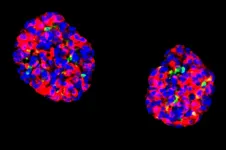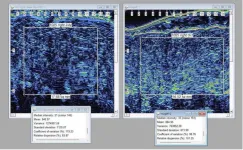(Press-News.org) Stem cells from the human stomach can be converted into cells that secrete insulin in response to rising blood sugar levels, offering a promising approach to treating diabetes, according to a preclinical study from researchers at Weill Cornell Medicine.
In the study, which appeared April 27 in Nature Cell Biology, the researchers showed that they could take stem cells obtained from human stomach tissue and reprogram them directly—with strikingly high efficiency—into cells that closely resemble pancreatic insulin-secreting cells known as beta cells. Transplants of small groups of these cells reversed disease signs in a mouse model of diabetes.
“This is a proof-of-concept study that gives us a solid foundation for developing a treatment, based on patients’ own cells, for type 1 diabetes and severe type 2 diabetes,” said study senior author Dr. Joe Zhou, a professor of regenerative medicine and a member of the Hartman Institute for Therapeutic Organ Regeneration at Weill Cornell Medicine.
Insulin is a hormone that regulates blood glucose levels—without it, blood glucose becomes too high, causing diabetes and its many complications. An estimated 1.6 million Americans have type 1 diabetes, which results from an autoimmune attack that destroys beta cells in the pancreas. At least several million other Americans lack sufficient beta cells due to severe type 2 diabetes. Current treatments in such cases include manual and wearable-pump injections of insulin, which have multiple drawbacks including pain, potentially inefficient glucose control, and the necessity of wearing cumbersome equipment.
Biomedical researchers aim to replace beta-cell function in a more natural way, with transplants of human cells that work as beta cells do: automatically sensing blood sugar levels and secreting insulin as needed. Ideally, such transplants would use patients’ own cells, to avoid the problem of transplant rejection.
Dr. Zhou has been working toward this goal for more than 15 years. In early experiments as a postdoctoral researcher, he discovered that ordinary pancreatic cells could be turned into insulin-producing beta-like cells by forcing the activation of three transcription factors—or proteins that control gene expression—resulting in the subsequent activation of genes required for the development of normal beta cells. In a 2016 study, again in mice, he and his team showed that certain stem cells in the stomach, called gastric stem cells, are also highly sensitive to this three-factor activation method.
“The stomach makes its own hormone-secreting cells, and stomach cells and pancreatic cells are adjacent in the embryonic stage of development, so in that sense it isn’t completely surprising that gastric stem cells can be so readily transformed into beta-like insulin-secreting cells,” Dr. Zhou said.
Attempts to reproduce these results using human gastric stem cells, which can be removed from patients relatively easily in an outpatient procedure called endoscopy, were slowed by various technical hurdles. However, in the new study, led by first author Dr. Xiaofeng Huang, an instructor of molecular biology in medicine at Weill Cornell Medicine, the researchers at last achieved success.
After turning human gastric stem cells into beta-like cells, the team grew the cells in small clusters called organoids and found that these organ-like pieces of tissue quickly became sensitive to glucose, responding with secretions of insulin. When transplanted into diabetic mice, the beta-like organoids functioned largely as real pancreatic beta cells would, secreting insulin in response to rises in blood glucose, and thereby keeping blood glucose levels steady. The transplants also kept working for as long as the researchers monitored them—six months—suggesting good durability.
Dr. Zhou said that he and his lab still need to optimize their method in various ways before it can be considered for clinical use. Necessary improvements include methods to increase the scale of beta-cell production for transplants to humans, and modifications of the beta-like cells to make them less vulnerable to the type of immune attack that initially wipes out beta cells in type 1 diabetes patients.
Ultimately, the researchers hope to develop a technique enabling the relatively easy harvesting of gastric stem cells from patients, followed by the transplant, weeks later, of insulin-secreting organoids that regulate blood sugar levels without the need for further medication.
END
Scientists target human stomach cells for diabetes therapy
2023-05-25
ELSE PRESS RELEASES FROM THIS DATE:
Sage’s 10-Year Impact Awards recognize research with long-term influence
2023-05-25
For the fourth year, Sage has awarded 10-Year Impact Awards to three research articles that have had a lasting influence over the past decade. The awards are given to the authors of three papers published in Sage Journals in 2012 that have received the most citations in the 10 years since than all other studies published in the same year.
The three winning papers are:
“The Nature and Organization of Individual Differences in Executive Functions: Four General Conclusions” by Akira Miyake and Naomi P. Friedman in Current Directions ...
CU researchers weave deeper understanding of diverse ancestry and gene expression
2023-05-25
Exploring diverse ancestry is a critical factor in furthering medical research.
A new study published in Nature Genetics from researchers in the Department of Biomedical Informatics (DBMI) at the University of Colorado School of Medicine, in partnership with the University of California San Francisco and Stanford University, is the largest of its kind that focuses on ancestry correlations with biomedical traits and the first study to examine the role of genetic variants across diverse ...
Does body contouring increase long-term weight loss after bariatric surgery? New findings
2023-05-25
May 25, 2023 – For patients with massive weight loss after bariatric surgery, subsequent body contouring to remove excess skin is not itself associated with long-term weight loss, reports a study in the June issue of Plastic and Reconstructive Surgery®, the official medical journal of the American Society of Plastic Surgeons (ASPS). The journal is published in the Lippincott portfolio by Wolters Kluwer.
"In contrast to previous studies, we found that body contouring ...
Epigenetic mechanisms activated by GHK-Cu increase skin collagen density in clinical trial
2023-05-25
Skin loses collagen and elastin and becomes progressively thinner with age leading to wrinkles, so reversing this age-related loss of skin density is the holy grail of anti-aging treatments. One compound capable of doing that is the naturally occurring peptide GHK-Cu (GHK from glycyl-L-histidyl-L-lysine bound to a copper ion), which affects 31.2% of the human genes by either activating or deactivating them (based on a criterion of a reduction or increment in gene activity of more than 50%), meaning that it works by ...
Scientists use AI to find promising new antibiotic to fight evasive hospital superbug
2023-05-25
Attention editors: Embargoed by the journal Nature Chemical Biology until Thursday, May 25 at 11 a.m. easter
Hamilton, ON, May 25, 2023 – Scientists at McMaster University and the Massachusetts Institute of Technology have used artificial intelligence to discover a new antibiotic which could be used to fight a deadly, drug-resistant pathogen that strikes vulnerable hospital patients.
The process they used could also speed the discovery of other antibiotics to treat many other challenging ...
A metabolic process in cancer cells could unlock a possible treatment for glioblastoma
2023-05-25
A study led by researchers at the UCLA Jonsson Comprehensive Cancer Center has found that targeting a metabolic process in people with a specific genetic mutation could help treat glioblastoma, an aggressive brain cancer.
The genetic alteration — a deletion in a gene called CDKN2A — is present in about 60% of people who have glioblastoma. The mutation causes changes in the way lipids are distributed in cancer cells, which in turn makes the cancer cells vulnerable to being destroyed. The ...
Can sugar and fat influence immune cell responses?
2023-05-25
LA JOLLA, CA—A population of unconventional white blood cells has recently captured the attention of immunologists and clinicians alike. Unlike conventional T cells, which circulate throughout the body in our blood, mucosal-associated invariant T (MAIT) cells are largely found in tissues where they provide immune protection against a broad range of diseases.
MAIT cells are highly abundant in humans. Although they make up only 2 percent of the lymphocytes in blood, MAIT cells account for 10 to 40 percent of lymphocytes in the liver, and they are common in tissues such as lungs. Still, much about MAIT cell biology and clinical function remains unknown.
In ...
County-level maternal vulnerability and preterm birth
2023-05-25
About The Study: The findings of this study using data for 3.6 million births suggest that the Maternal Vulnerability Index (MVI), a novel county-level index designed to quantify maternal vulnerability to adverse health outcomes, was associated with preterm birth even after adjustment for individual-level confounders. The MVI is a useful measure for county-level preterm birth risk that may have policy implications for counties working to lower preterm rates and improve perinatal outcomes.
Authors: Sara C. Handley, M.D., M.S.C.E., Children’s Hospital of Philadelphia, is the corresponding author.
To ...
Deep learning for detection and symptom severity assessment of autism spectrum disorder
2023-05-25
About The Study: In this diagnostic study of 45 children with autism spectrum disorder (ASD) and 50 with typical development, a deep learning system trained on videos acquired using a joint attention–eliciting protocol for classifying ASD versus typical development and predicting ASD symptom severity showed high predictive performance. This new artificial intelligence–assisted approach based predictions on participants’ behavioral responses triggered by social cues. The findings suggest that this method may allow digital measurement of joint attention; however, follow-up studies are necessary for further validation.
Authors: Yu ...
Using AI, scientists find a drug that could combat drug-resistant infections
2023-05-25
CAMBRIDGE, MA -- Using an artificial intelligence algorithm, researchers at MIT and McMaster University have identified a new antibiotic that can kill a type of bacteria that is responsible for many drug-resistant infections.
If developed for use in patients, the drug could help to combat Acinetobacter baumannii, a species of bacteria that is often found in hospitals and can lead to pneumonia, meningitis, and other serious infections. The microbe is also a leading cause of infections in wounded soldiers in Iraq and Afghanistan.
“Acinetobacter can survive on hospital doorknobs and equipment ...




